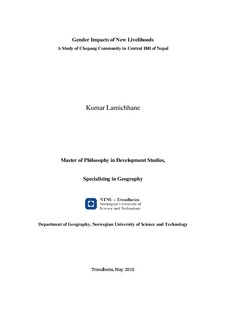Gender impacts of new livelihoods : a study of Chepang community in central hill of Nepal
Master thesis
Permanent lenke
http://hdl.handle.net/11250/2448256Utgivelsesdato
2015Metadata
Vis full innførselSamlinger
- Institutt for geografi [1097]
Sammendrag
This study was undertaken to identify the impact of outmigration in Chepang community of central hill in Nepal, from gender point of view. The main objective of this study was to trace out the continuity and changes in traditional gender norms and practices in relation to migration and changing livelihoods in indigenous Chepang community of Raksirang village. Analytical framework was developed based on the social relation approach, which has identified 5 major components – rules, power, resources, activities and people – as the integral parts of every social relation, including gender. Tools of qualitative research were applied in order to collect the information from various informants, including local people, experts and different organizations. Subjective interaction with local people was the main way to understand the life experiences of Chepang people.
The study found that Chepang community has more equitable and rational gender norms and practices. The traditional gender based division of labor was found to be highly flexible. Both Chepang men and women had been enjoying equal social rights and status in traditional Chepang community. However, the link with urban sector and capitalist market has adversely affected the egalitarian norms of Chepang people, and has subjected Chepang men in greater deprivation. Chepang men were forced to migrate to the urban area to work as cheap labor in capitalist markets, where they are surviving in filthy living condition, hazardous working environment, and extreme exploitations. Meanwhile, Chepang women have got opportunity to empower themselves with the involvement in NGO-led development project at their own community. Women centered development policies and programs in Nepal always assumed men as oppressor and impediments for women empowerment. As a result men are being systematically marginalized from the opportunities of empowerment and development programs in their own community. This has highly adverse impact on general welfare of the society, neither it will allow achieving the goal of gender equity and equality in long term.
